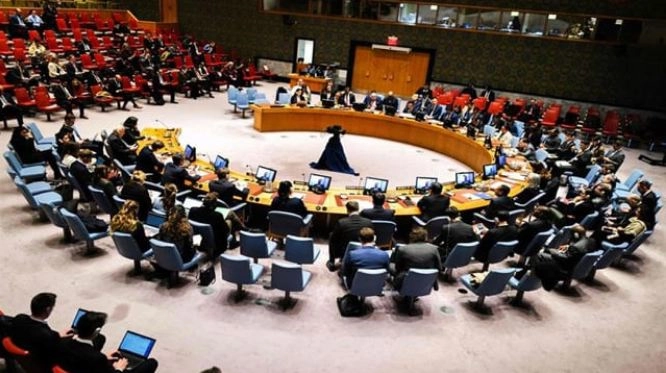UNSC meeting on intensified Iran-Israel tension urge restraint by all parties

UNITED NATIONS (APP) - The United Nations Security Council (UNSC) held an emergency meeting Sunday afternoon to discuss Iran’s attack on Israel, with diplomats calling for restraint by all parties to prevent conflict in the region from spreading.
Over the weekend, the drone and missile attack that Iran launched against Israel in retaliation for the Israeli bombing of its consulate in Damascus earlier in the month, was the first time Tehran had directly hit Israel from its soil. The development raised concerns among diplomats and UN officials that a new, potentially wide and destructive war could spark if both sides don’t stand down.
UN Secretary-General Antonio Guterres told the Council that it was 'time to step back from the brink,' and that its members, as well as the United Nations at large, had the collective responsibility 'to actively engage all parties concerned to prevent further escalation.' The same was the message from Pakistan. In a statement issued in Islamabad, the Pakistani Foreign Office called for 'utmost restraint'. “It is now critically urgent to stabilize the situation and restore peace.” The Council, which met at the request of Israel, has not collectively issued a statement on the Iranian attacks and against Israel, and it has also not issued a statement condemning Israel’s attack on Iran’s embassy in Damascus that killed several senior commanders.
All 15 members of the Council must reach a consensus for a statement to be issued and none was reached on both issues.
On Sunday, both Israel and Iran’s ambassadors were present and delivered fiery comments about the other’s country, blaming each other for actions they both called terrorism. Iran’s ambassador Amir Saeid Iravani said his country had an 'inherent right to self-defense' after Israel’s attack on its diplomatic compound. Iravani said that Iran “does not seek escalation or war in the region,” but that if its interests, people or national security came under attack it would “respond to any such threat or aggressions vigorously and in accordance with international law.”
The United States and Iran both said that they do not seek war with one another, but that if one attacks the other’s interests, there would be a defensive response. US Representative to the UN Robert Wood told the Security Council that the “US is not seeking escalation, our actions have been defensive in nature,” and said the US goal was to 'de-escalate' and then get back to securing an end to the conflict in Gaza. Wood said the US planned to bring further action on Iran at the Council and called on the 15-member body to unequivocally condemn Iran’s actions.
Any resolution against Iran put forth by the US at the Council would likely be vetoed by Russia and China, two of Iran’s close allies, who sharply criticized Israel for what they said was reckless violation of international law when it attacked Iran’s embassy compound. “What happened in the night of the 14th of April did not happen in a vacuum,” said Vasily Nebenzya, Russia’s ambassador to the UN China’s ambassador, Dai Bing, called on the Council to “exercise maximum calm and restraint” and said the implementation of an immediate cease-fire is the “top priority.”
On its part, Israel said that the embassy compound was a legitimate military target because senior commanders from Iran’s Quds Forces, the external branch of the Revolutionary Guards Corps, were holding a meeting inside the building. In his remarks, the UN chief said the people of the Middle East are facing a real danger of a devastating full-scale conflict and urged 'maximum restraint' across a region “on the brink”.
“It is vital to avoid any action that could lead to major military confrontations on multiple fronts in the Middle East…Now is the time for maximum restraint,” the UN Secretary-General said. Guterres said that the emergency session was called by Israel following what it described in a letter as ‘a direct attack launched by Iran… of more than 200 UAVs, cruise missiles, and ballistic missiles towards Israel in clear violation of international law.’
The UN chief added that in a separate letter, Iran stated that it had carried out a series of military strikes on Israeli military objectives ‘in the exercise of Iran’s inherent right to self-defence as outlined…in the UN Charter, and in response to…its armed attack on 1 April 2024 against Iranian diplomatic premises’ – in Damascus.







